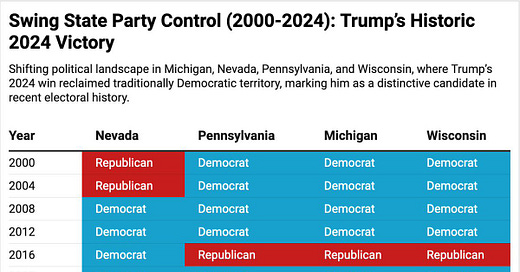The Trump Era: An Unprecedented Political Legacy in U.S. History
How Donald Trump’s 2024 Victory Reshaped the Electoral Map and Cemented His Political Legacy
In the annals of American political history, few figures have upended tradition, redefined voter coalitions, and challenged conventional expectations like Donald J. Trump. His 2024 victory stands as a singular achievement: Trump is only the second president in U.S. history, after Grover Cleveland, to win a non-consecutive term following an electoral defeat. This achievement alone places him in a rare class, but Trump’s impact goes far deeper. He has not only reshaped the Republican Party but also redrawn the American electoral map, especially across the Rust Belt and swing states where Democrats once enjoyed consistent dominance.
Trump’s 2024 victory over Kamala Harris underscores his profound influence on America’s political landscape. With wins in Michigan, Pennsylvania, and Wisconsin in both 2016 and 2024, Trump has repeatedly breached the so-called “Blue Wall”— state that propelled Barack Obama to two presidential victories and reliably voted Democratic since the early 1990s. His success in these traditionally Democratic states demonstrates a political realignment of voter loyalties in the industrial Midwest, the heart of America’s working class. His victories there, despite significant opposition and two impeachments, underscore his connection with a base of voters often overlooked by both parties for decades: rural, white working-class communities.
Breaking the "Blue Wall" Twice
Trump’s ability to capture Michigan, Pennsylvania, and Wisconsin twice now is a feat that few political analysts could have foreseen just a decade ago. These states, often regarded as linchpins for Democratic presidential victories. The conventional wisdom was that a Republican would need an overwhelming national shift to overcome the Democratic advantage in these states.
Trump, however, tapped into a powerful set of issues that resonated deeply with Rust Belt voters. By focusing on jobs, trade, and “America First” economic policies, he spoke directly to the economic anxieties that had long simmered in these post-industrial states. In both 2016 and 2024, Trump’s messaging on trade, manufacturing, and economic patriotism helped him cut through the historical Democratic lean, flipping these states into the Republican column and, in the process, proving that the “Blue Wall” was no longer impenetrable.
A Win in Nevada for Republicans
In addition to his success in the Rust Belt, Trump’s 2024 victory in Nevada marked a significant breakthrough for Republicans in the Southwest. Nevada, which had not voted for a Republican presidential candidate since George W. Bush in 2004, has seen major demographic shifts, with growing Latino, union voters, and young voter populations. Trump’s appeal to this diverse electorate surprised many, showcasing a shift that could have implications for the future of the GOP in other states with similar demographic trends.
Trump’s win in Nevada, a state typically considered blue, reflects his ability to transcend traditional Republican voter bases. His focus on economic growth and border security appealed not only to rural and conservative Nevadans but also to some of the state’s working-class voters. This win suggests that Trump’s appeal might extend further than previously thought and could signify an evolving Republican strategy in other blue states trending Republican such as New Jersey.
Trump’s Political Resilience and the Populist Shift
Beyond his geographic victories, Trump’s continued influence underscores a shift within the Republican Party itself. He has shifted the party’s focus from traditional conservative policies to a populist, America-first agenda that emphasizes nationalism, skepticism of foreign alliances, and a focus on domestic industry and border security. The Republican voter base now includes a more significant number of working-class Americans, particularly those who feel left behind by globalization and economic change.
This transformation has sparked new political energy within the GOP, turning it into a party that is markedly more populist and nationalistic. Trump’s influence is a departure from the establishment-driven Republicanism of the pre-2016 era, marking a pivot to issues that resonate deeply with middle- and working-class Americans across demographics.
A Lasting Legacy in Modern Politics
Trump’s resilience is striking. Despite the controversies that have surrounded his presidency and his defeat in 2020, he has remained a formidable force. His 2024 comeback is a testament to his unique connection with his base, demonstrating that loyalty within the Republican ranks is not easily swayed. The fact that he managed to come back and secure a non-consecutive second term highlights his ability to mobilize his supporters, an achievement matched only by Grover Cleveland in the late 19th century.
The Trump era has redefined American politics, challenging norms and reshaping alliances. By breaking through Democratic strongholds, winning back disaffected voters, and reshaping the GOP, Trump has shown that his influence is more than a temporary phenomenon. His 2024 victory signifies not just a return to power but a consolidation of his legacy as one of the most influential political figures in recent American history. As America moves forward, the effects of the Trump era will likely reverberate for years, as future candidates grapple with the realigned political landscape he leaves behind.




